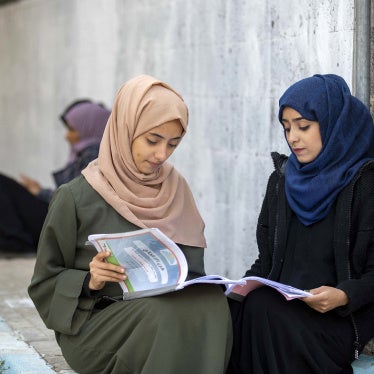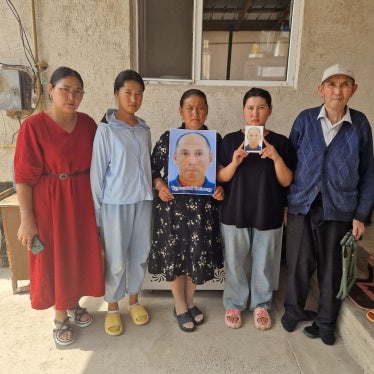“I decided to travel abroad for work to build a house,” Tahira told me. With few options for work in her village in Subang district, West Java, the 28-year-old migrated to the United Arab Emirates in 2012 to become a domestic worker. She had high hopes of making enough money there to support her husband and young son at home in Indonesia. But her dream quickly became a nightmare.
“My boss started hitting me after two weeks of being there,” Tahira told me. “She hit me with her fist to my chest. She scraped her fingernails to my neck, and slapped my face. I was bruised on my neck. She sometimes pulled out tufts of my hair.”
Frequent news reports about abuses of Indonesian domestic workers who migrate to the Gulf show that Tahira’s experience was not unique. Tahira, whose name was changed for her protection, was one of the 4.3 million Indonesians estimated to be working abroad in 2012. Approximately 76 percent are women, and 90 percent of those are domestic workers. Many of them migrate to the Gulf.
President Joko Widodo has expressed support for the rights of Indonesian migrants abroad. Human Rights Watch has urged him to make that a priority.
Tahira was one of 99 migrant domestic workers my colleague and I interviewed in the UAE for a new Human Rights Watch report. We documented how the UAE’s visa-sponsorship system, known as kafala, and lack of labor law protections open migrant domestic workers to abuse. The kafala system does not allow domestic workers to move from one employer to another without the employer’s consent before their contract ends, trapping many workers in abusive conditions.
The domestic workers we interviewed reported a wide range of abuses, including non-payment of wages; excessively long working hours with no rest periods or days off; confinement to the employer’s household; confiscation of workers’ passports; lack of food; poor sleeping conditions; and mental and physical abuse, including sexual abuse. Many recruiters in workers’ home countries, including Indonesia, gave them contracts with attractive pay and conditions, only for these to be “substituted” when they arrived in the UAE by new contracts with much lower pay.
Tahira told me: “If she [her employer] wasn’t happy with my work, she wouldn’t give me food. Once I didn’t eat for three days.” She said her employer locked her in the house, kept hold of her passport, and shouted at her every day. Her employer, she said, required her to work for 15 hours each day with no rest periods or days off, and paid her nothing during the six months that she worked there.
Matters came to boil in 2013, Tahira said, after her employer twisted Tahira’s arm so violently in March that she broke a bone, and in May threw a shoe at her, making her bleed. When her employer went to clean the blood, Tahira said, she grabbed a key and fled.
Tahira filed a police complaint. But months later she was still waiting to learn the outcome, and had received no pay. She was still hoping for some justice and recompense when I met her, but many workers in her position give up pursuing claims due to court delays and other obstacles.
Human Rights Watch is pressing the UAE to urgently reform its laws and practices on domestic workers. It should extend labor law protections to cover all domestic workers and enforce them, better regulate recruitment practices, make remedies accessible, and throw out the discredited kafala visa system.
But sending countries — like Indonesia — also have a vital role to play. Like several other countries, Indonesia has suspended migration for domestic work to countries in the Gulf intermittently, sometimes in response to severe abuses, and sometimes due to disputes with host countries over contract and visa procedures. But workers continue to migrate, and some face exploitation and abuse.
Indonesia has taken important steps toward protecting the rights of Indonesians who migrate for work, such as ratifying an international treaty on migrant workers and their families and banning some abusive recruitment agencies. But it can and should do more.
For one thing, Indonesia should ratify the ILO Domestic Workers Convention, an international labor treaty outlining key rights for domestic workers.
Indonesia’s new administration should improve its coordination with the UAE to put an end to deceptive contract practices. Indonesian consular officials in the UAE should be adequately trained and have enough resources to deal with cases of domestic worker abuse. And Indonesia should promote stronger region-wide standards, to avoid unhealthy competition between sending countries that exposes their nationals to abuse. Finally, Indonesia should protect the domestic workers employed in Indonesian homes by quickly passing a pending labor law covering the rights of domestic workers.
“When I go home,” Tahira said, “I hope I can be in a house and be with my child until he is big.” If only that house could be bought with the wages that Tahira earned but was never paid in the UAE. Then, the nightmare might again be replaced by a dream.








